China Sends Aircraft Carrier Group Through Taiwan Strait
 (BEIJING) — China said Wednesday it was committed to promoting peace and stability in Asia, even as it sent an aircraft carrier battle group through the Taiwan Strait amid heightened tensions between Beijing and the self-ruled island.
(BEIJING) — China said Wednesday it was committed to promoting peace and stability in Asia, even as it sent an aircraft carrier battle group through the Taiwan Strait amid heightened tensions between Beijing and the self-ruled island.
The statement in the preface to a Cabinet report on China’s policies on Asia-Pacific security cooperation follows heated criticism from the U. S., Japan and others over Beijing’s increasingly robust assertions of its maritime claims, particularly in the South China Sea.
The report made no direct reference to such concerns while casting Beijing as a force for economic development and conflict reduction.
“China is committed to promoting peace and stability in this region. It follows the path of peaceful development and the mutually beneficial strategy of opening up,” the report said.
“It has participated in regional cooperation in an all-round way and taken active steps in response to both traditional and non-traditional security challenges, contributing to lasting peace and common prosperity in the Asia-Pacific region,” it said.
The report reiterated China’s claims over South China Sea islands and waters, as well as territories in the East China Sea controlled by Japan. It also expressed strong opposition to the deployment by the U. S. and South Korea of an advanced missile defense system to counter threats from North Korea, saying that would “seriously damage the regional strategic balance and the strategic security interests of China and other countries in the region.”
However, the emphasis was firmly on China’s contributions to security and willingness to cooperate with others on “improving the regional security framework.”
“China has actively pushed for peaceful solutions to hotspot issues such as the nuclear issue on the Korean Peninsula and the Afghanistan issue, and played its due role as a responsible major country,” the report said.
Despite such rhetoric, China’s rapid military modernization has raised concerns about its intentions, particularly regarding Taiwan, which it claims as its territory.
Earlier Wednesday, Taiwan’s Defense Ministry said it was keeping an eye on China’s sole aircraft carrier, the Liaoning, and its battle group as it passed through the 160 kilometer- (100 mile-) wide strait separating Taiwan from southeastern China.
A ministry statement said the Liaoning was traveling northwest along the center line dividing the strait and urged the public not to be alarmed.
China and Taiwan split amid civil war in 1949 and Beijing has never renounced its threat to use force if it considers that necessary to prevent the island’s permanent independence from the mainland.
Relations have deteriorated since Taiwanese elected independence-leaning President Tsai Ing-wen last year, and Chinese officials have warned of more turbulence ahead unless she endorses Beijing’s view that Taiwan is part of China.
China has been steadily ratcheting up pressure, discouraging Chinese tourists from visiting the island of 23 million and intervening to prevent its participation in international forums.
“Looking ahead in 2017, the development of cross-strait relations faces increased levels of uncertainty and the challenge of risk has risen,” Ma Xiaoguang, spokesman for the Cabinet’s Taiwan Affairs Office, told reporters Wednesday.
Ma said he had no information on the Liaoning’s passage through the Taiwan Strait and referred questions on the matter to the Defense Ministry, which did not immediately respond.
The significance of the carrier’s passage through the strait was open to interpretation, said Zhao Gancheng, director of the Asia-Pacific Center at Shanghai’s Institute for International Studies.
“China has now acquired numerous means to pose threats to Taiwan. If the Taiwan side interprets it as a threat, that’s a matter for Taiwan,” said Zhao, adding such missions would grow more frequent as the Chinese navy gained new capabilities.
However, Vice Foreign Minister Liu Zhenmin said the issue wouldn’t affect relations between the sides.
China’s navy “does not pose a threat to the security of this region or to neighboring countries,” said Liu, speaking at a news conference to discuss the Cabinet report.
© Source: http://feedproxy.google.com/~r/time/topstories/~3/BD8mpsSSz04/
All rights are reserved and belongs to a source media.


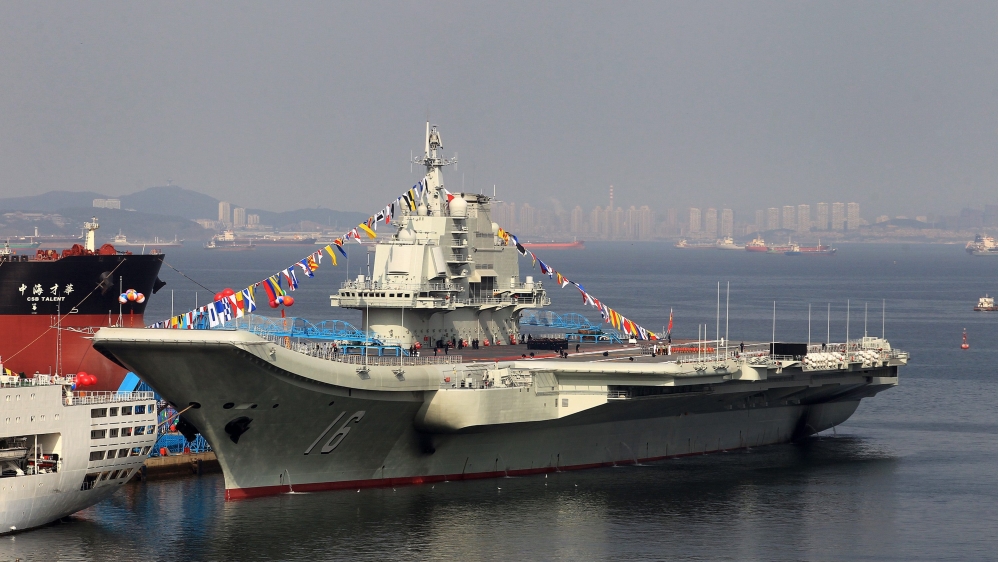 Taiwan has urged its citizens to remain calm after a Chinese aircraft carrier entered the Taiwan Strait in a highly symbolic show of strength.
Taiwan has urged its citizens to remain calm after a Chinese aircraft carrier entered the Taiwan Strait in a highly symbolic show of strength. 
 China’s Soviet-built ‘Liaoning’ aircraft carrier led warships through the Taiwan Strait on Wednesday, while returning from exercises in the South China Sea. Although Taiwan’s Defense Ministry stated that the carrier was not trespassing in the country’s territorial waters, it confirmed that it did enter its air defense identification zone (ADIZ) in the southwest.
China’s Soviet-built ‘Liaoning’ aircraft carrier led warships through the Taiwan Strait on Wednesday, while returning from exercises in the South China Sea. Although Taiwan’s Defense Ministry stated that the carrier was not trespassing in the country’s territorial waters, it confirmed that it did enter its air defense identification zone (ADIZ) in the southwest. 
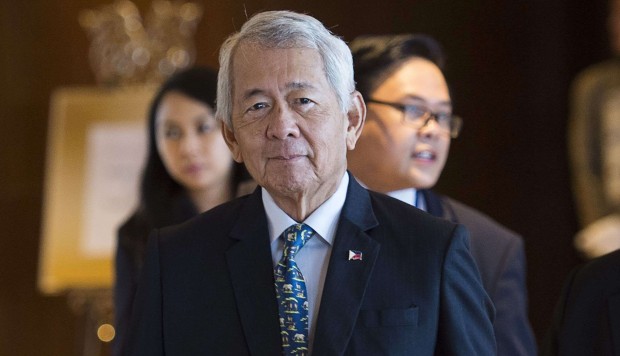 The Philippines won’t raise its recent arbitration victory against Chinese territorial claims in the South China Sea during Asian summit talks that it will host this year, Foreign Secretary Perfecto Yasay Jr. said Wednesday. Yasay said pressing last year’s ruling at the annual meetings of the Association of Southeast Asian Nations “is just simply counter-productive.” The Philippines intends to raise the ruling, which invalidated China’s historic claims under a 1982 U. N. treaty, in bilateral talks with Beijing in the future, Yasay said, stressing that the arbitration decision is final and won’t be changed by discussions at international conferences. “We are not going to raise this issue … because there is really no useful benefit,” Yasay said at a news conference. “This is a matter that we will be raising with China at some future time in bilateral talks and to do and involve others in the discussion of this decision is just simply counter-productive for our purposes.” “Now if any country would like to pursue their respective claims against China with respect to a disputed territory in the South China Sea, they can do so and perhaps use the decision of the arbitral tribunal as a precedent-setting case in pursuing the matter,” he said. The Philippines was previously one of the most vocal critics of China at the annual ASEAN meetings as Beijing asserted its vast territorial claims in the South China Sea. After China took control of disputed Scarborough Shoal in 2012 and blocked Filipinos from the rich fishing area, then President Benigno Aquino III brought his country’s territorial disputes with Beijing to international arbitration. China ignored the Philippine case and refused to recognize the outcome, which was heavily in favor of the Philippines. President Rodrigo Duterte, who succeeded Aquino in June, has taken dramatic steps to mend strained relations with China. He has also taken an antagonistic stance against the administration of outgoing President Barack Obama after the U. S. leader criticized his deadly crackdown on illegal drugs. As host of the ASEAN meetings this year, the Philippines is in a position to influence their focus and the joint communiques issued at the end of the conferences. China, the U. S. and Russia and other Western and Asian nations will join expanded meetings later in the year. Yasay said the Philippines will push for the faster completion of a long-delayed “code of conduct” between China and ASEAN to discourage aggressive actions that could ratchet up tensions in the South China Sea, a busy waterway for world trade. The Philippines wants the framework of the nonaggression pact to be completed within the first half of this year, Yasay said. The prospects for the signing of a legally binding regional code remain unclear. Philippine diplomats have said negotiations over the code have been stalled in the past by China while it covertly turned disputed reefs into artificial islands which can now be used by Beijing to better defend its territorial claims.
The Philippines won’t raise its recent arbitration victory against Chinese territorial claims in the South China Sea during Asian summit talks that it will host this year, Foreign Secretary Perfecto Yasay Jr. said Wednesday. Yasay said pressing last year’s ruling at the annual meetings of the Association of Southeast Asian Nations “is just simply counter-productive.” The Philippines intends to raise the ruling, which invalidated China’s historic claims under a 1982 U. N. treaty, in bilateral talks with Beijing in the future, Yasay said, stressing that the arbitration decision is final and won’t be changed by discussions at international conferences. “We are not going to raise this issue … because there is really no useful benefit,” Yasay said at a news conference. “This is a matter that we will be raising with China at some future time in bilateral talks and to do and involve others in the discussion of this decision is just simply counter-productive for our purposes.” “Now if any country would like to pursue their respective claims against China with respect to a disputed territory in the South China Sea, they can do so and perhaps use the decision of the arbitral tribunal as a precedent-setting case in pursuing the matter,” he said. The Philippines was previously one of the most vocal critics of China at the annual ASEAN meetings as Beijing asserted its vast territorial claims in the South China Sea. After China took control of disputed Scarborough Shoal in 2012 and blocked Filipinos from the rich fishing area, then President Benigno Aquino III brought his country’s territorial disputes with Beijing to international arbitration. China ignored the Philippine case and refused to recognize the outcome, which was heavily in favor of the Philippines. President Rodrigo Duterte, who succeeded Aquino in June, has taken dramatic steps to mend strained relations with China. He has also taken an antagonistic stance against the administration of outgoing President Barack Obama after the U. S. leader criticized his deadly crackdown on illegal drugs. As host of the ASEAN meetings this year, the Philippines is in a position to influence their focus and the joint communiques issued at the end of the conferences. China, the U. S. and Russia and other Western and Asian nations will join expanded meetings later in the year. Yasay said the Philippines will push for the faster completion of a long-delayed “code of conduct” between China and ASEAN to discourage aggressive actions that could ratchet up tensions in the South China Sea, a busy waterway for world trade. The Philippines wants the framework of the nonaggression pact to be completed within the first half of this year, Yasay said. The prospects for the signing of a legally binding regional code remain unclear. Philippine diplomats have said negotiations over the code have been stalled in the past by China while it covertly turned disputed reefs into artificial islands which can now be used by Beijing to better defend its territorial claims.
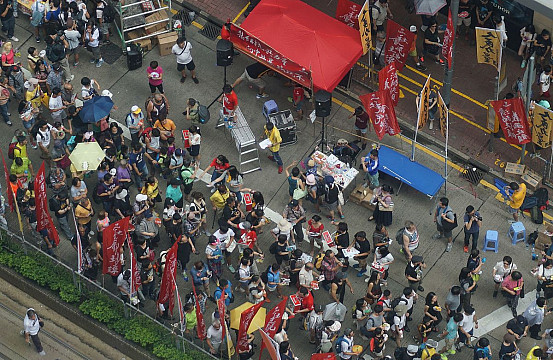 Amnesty International has released its Hong Kong Annual Report reviewing the human rights of Hong Kong over the past year. It states that the city’s human rights situation has rapidly deteriorated in recent times and is at its worst levels since the handover back to Chinese rule in 1997.
Amnesty International has released its Hong Kong Annual Report reviewing the human rights of Hong Kong over the past year. It states that the city’s human rights situation has rapidly deteriorated in recent times and is at its worst levels since the handover back to Chinese rule in 1997. 
 The price of bitcoin fell by around 10 percent after Chinese authorities announced plans to inspect bitcoin enterprises.
The price of bitcoin fell by around 10 percent after Chinese authorities announced plans to inspect bitcoin enterprises. 
 BEIJING — For generations, the “Eight-Year War of Resistance Against Japanese Aggression” has been ingrained in the minds of Chinese schoolchildren. Revolutionary hymns evoked the bloody years, from 1937 to 1945, of what is known outside China as the Second Sino-Japanese War. Documentaries denounced Japan ’s “eight years of belligerence.”
BEIJING — For generations, the “Eight-Year War of Resistance Against Japanese Aggression” has been ingrained in the minds of Chinese schoolchildren. Revolutionary hymns evoked the bloody years, from 1937 to 1945, of what is known outside China as the Second Sino-Japanese War. Documentaries denounced Japan ’s “eight years of belligerence.” 
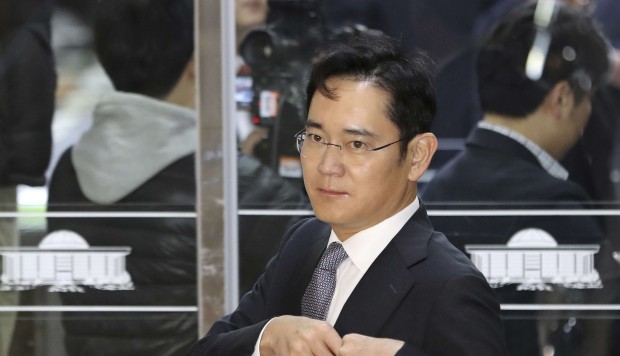 Samsung heir Lee Jae-yong has become a criminal suspect in a widening probe into the corruption and influence-peddling scandal engulfing the impeached , prosecutors said Wednesday. Lee, vice chairman of Samsung Electronics and the son of the Samsung Group chairman Lee Kun-hee, would be quizzed as a “suspect” in connection to bribery, prosecutors said. “We have decided to question Lee tomorrow morning… as a suspect,” Lee Kyu-Chul, spokesman for the team of special prosecutors investigating the scandal, told reporters. The affair centres on , who is accused of using her ties to Park to coerce top firms into “donating” tens of millions of dollars to two non-profit foundations which Choi then used as her personal ATMs. Samsung was the biggest contributor to the foundations. It is also accused of separately giving millions of euros to Choi to bankroll her daughter’s equestrian training in Germany in a bid to curry favour. Prosecutors have for months questioned Lee and other senior Samsung officials. The officials reportedly argued that although they were coerced to offer money, they sought no favours in return and thus the payments were not a bribe. Spokesman Lee said prosecutors “left open the possibility” of formally arresting the Samsung scion later. Prosecutors are investigating whether Samsung bribed Choi in order to win state approval for a controversial merger which it sought in 2015. The merger of two Samsung group units – Cheil Industries and Samsung C&T – was seen as a crucial step towards ensuring a smooth third-generation power transfer to Lee Jae-yong. It was criticised by many, who said it wilfully undervalued Samsung C&T’s stocks. But the National Pension Service (NPS) – a major Samsung shareholder – voted in favour of the deal and it eventually went through. Prosecutors have raided multiple Samsung offices as well as the NPS in connection with the scandal. The fund – the world’s third largest pension fund – is overseen by the welfare ministry. A former welfare minister was arrested last month for allegedly pressuring NPS officials to vote in favour of the Samsung deal. Park, who stands accused of colluding with Choi to extract money from the firms, was impeached by parliament last month but denies any criminal wrongdoing. The Constitutional Court is currently reviewing the validity of her impeachment. Choi is on trial for charges including coercion and abuse of power.
Samsung heir Lee Jae-yong has become a criminal suspect in a widening probe into the corruption and influence-peddling scandal engulfing the impeached , prosecutors said Wednesday. Lee, vice chairman of Samsung Electronics and the son of the Samsung Group chairman Lee Kun-hee, would be quizzed as a “suspect” in connection to bribery, prosecutors said. “We have decided to question Lee tomorrow morning… as a suspect,” Lee Kyu-Chul, spokesman for the team of special prosecutors investigating the scandal, told reporters. The affair centres on , who is accused of using her ties to Park to coerce top firms into “donating” tens of millions of dollars to two non-profit foundations which Choi then used as her personal ATMs. Samsung was the biggest contributor to the foundations. It is also accused of separately giving millions of euros to Choi to bankroll her daughter’s equestrian training in Germany in a bid to curry favour. Prosecutors have for months questioned Lee and other senior Samsung officials. The officials reportedly argued that although they were coerced to offer money, they sought no favours in return and thus the payments were not a bribe. Spokesman Lee said prosecutors “left open the possibility” of formally arresting the Samsung scion later. Prosecutors are investigating whether Samsung bribed Choi in order to win state approval for a controversial merger which it sought in 2015. The merger of two Samsung group units – Cheil Industries and Samsung C&T – was seen as a crucial step towards ensuring a smooth third-generation power transfer to Lee Jae-yong. It was criticised by many, who said it wilfully undervalued Samsung C&T’s stocks. But the National Pension Service (NPS) – a major Samsung shareholder – voted in favour of the deal and it eventually went through. Prosecutors have raided multiple Samsung offices as well as the NPS in connection with the scandal. The fund – the world’s third largest pension fund – is overseen by the welfare ministry. A former welfare minister was arrested last month for allegedly pressuring NPS officials to vote in favour of the Samsung deal. Park, who stands accused of colluding with Choi to extract money from the firms, was impeached by parliament last month but denies any criminal wrongdoing. The Constitutional Court is currently reviewing the validity of her impeachment. Choi is on trial for charges including coercion and abuse of power.
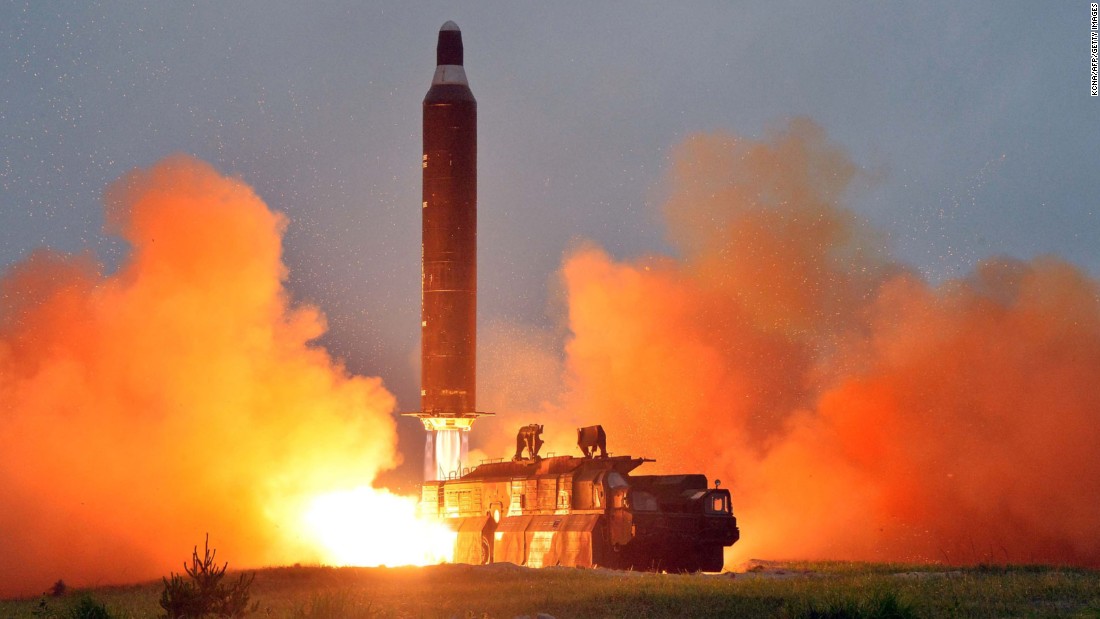 US Defense Secretary Ash Carter said Tuesday that if launches do not pose a risk to the US or an ally, « it may be more to our advantage… to gather intelligence from the flight. »
US Defense Secretary Ash Carter said Tuesday that if launches do not pose a risk to the US or an ally, « it may be more to our advantage… to gather intelligence from the flight. » 
 The December 9 impeachment of South Korean President Park Geun-hye has created a vacuum of political leadership in South Korea. Normally, the South Korean president would lead a full court press to confirm President-elect Donald Trump’s commitment to the U. S.-ROK security alliance and coordinate a consistent approach to the growing North Korean nuclear threat.
The December 9 impeachment of South Korean President Park Geun-hye has created a vacuum of political leadership in South Korea. Normally, the South Korean president would lead a full court press to confirm President-elect Donald Trump’s commitment to the U. S.-ROK security alliance and coordinate a consistent approach to the growing North Korean nuclear threat. 

